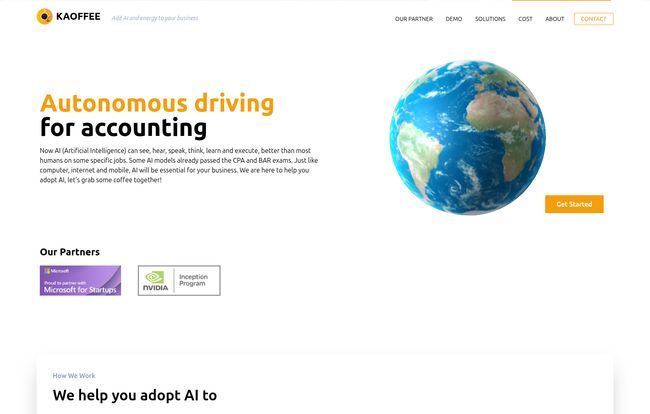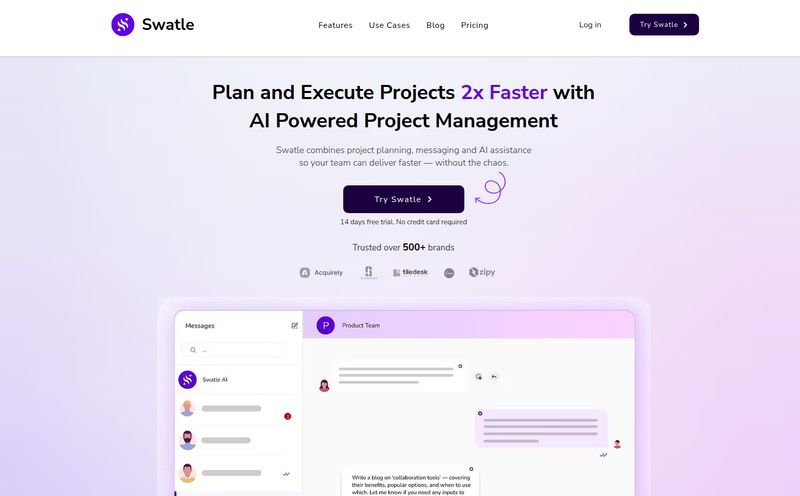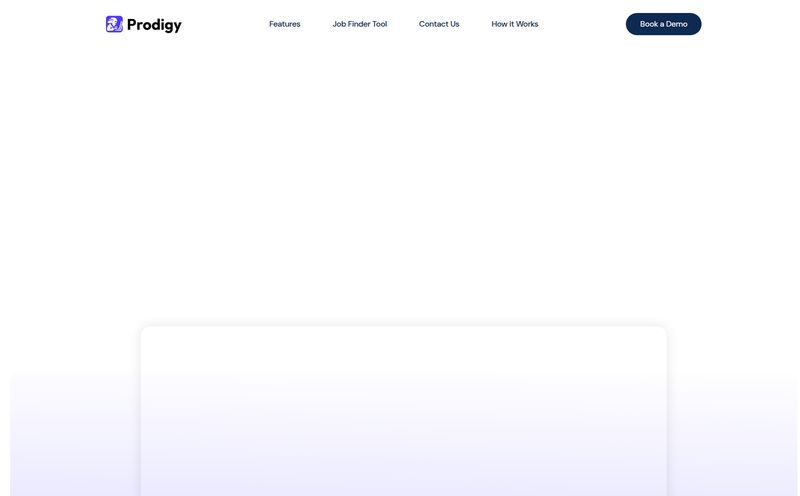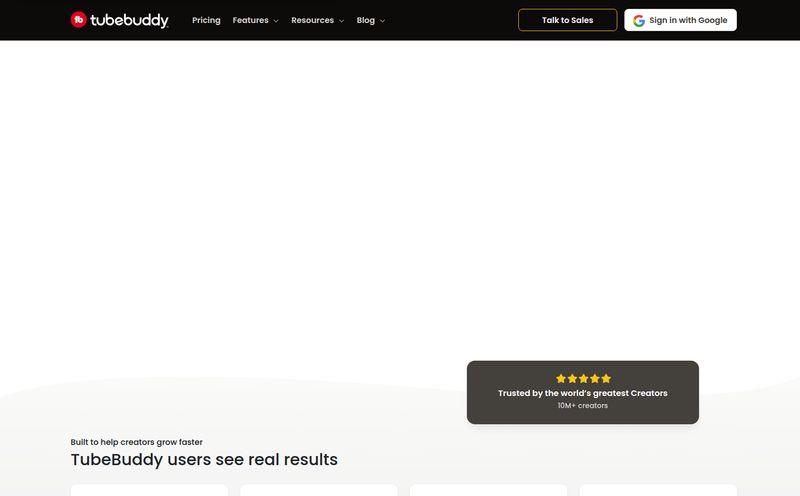In the world of SEO and digital business, we're drowning in AI tools. Every week, there’s a new “game-changer” that promises to write all our content, manage our clients, and probably walk our dogs. Most of them are… well, they’re fine. They do a thing. But it's rare that something makes me sit up and really take notice.
So, when I stumbled upon Kaoffee, my initial reaction was a healthy dose of skepticism. Another AI chat module? Groundbreaking. But then I looked a little closer. The landing page wasn't just throwing generic business platitudes at me; it was talking about specific, nitty-gritty problems. It was talking about accounting innovation, receipt processing, and creating an autonomous workforce. Okay, now you have my attention.
This isn't just another plug-and-play chatbot that pulls from a generic knowledge base. This is about creating a personalized ChatGPT experience for your own website, trained on your data. And that, my friends, is a whole different ballgame.
What Exactly is Kaoffee? (And Why Should You Care?)
Imagine you could hire a new team member. You sit them down, give them your entire library of company procedures, product manuals, past client Q&As, and internal memos. You tell them, "Learn all of this. Then, go answer our customers' questions."
That’s basically Kaoffee. It’s an AI chat module, built on the powerful foundation of ChatGPT, that you can embed on your website. The magic isn't that it can chat—we've seen that. The magic is that you train it on your own custom documents. It becomes an extension of your business’s unique brain, speaking with your voice and knowledge. It stops giving generic answers and starts providing genuinely helpful, context-specific information. For any business that gets asked the same set of questions over and over, this is a massive deal.
More Than Just a Chatbot: A Deep Dive into Kaoffee for Accounting
While Kaoffee could work for a lot of industries, their website really zeroes in on accounting. And it makes perfect sense. Accounting is a world of rules, repeatable processes, and an Everest of documentation. It’s a prime candidate for some intelligent automation.
Taming the Paper Dragon: The Receipt Reader
I saw their “Receipt Reader” feature and immediately thought of every small business owner and bookkeeper I know. The sheer amount of time wasted on manually entering data from a mountain of crumpled receipts is... staggering. Kaoffee proposes an AI that can scan, read, and process this information automatically. This isn’t just about saving time; it’s about reducing the tiny, human errors that creep in at 4 PM on a Friday, which can lead to compliance headaches and what they call “financial leakage.” A small term for a big problem.

Visit Kaoffee
Your New 24/7 Autonomous Assistant
The platform also talks about creating an “Autonomous Process.” Think about the routine tasks that clog up a firm's day: generating invoices, pulling standard financial reports, answering basic tax prep questions. Kaoffee can be trained to handle these tasks 24/7. It doesn’t need a coffee break, it doesn't get sick, and it certainly doesn't mind being asked the same question about tax deadlines for the 100th time. This frees up the actual humans—the highly-paid, highly-skilled accountants—to focus on strategy, client relationships, and complex problem-solving. The stuff a machine can’t do.
"Better Than Humans"? Let’s Be Real.
Okay, here’s where I have to step in. The site claims the AI is “Better than humans.” It's a bold marketing claim, and while I get the point, I think it needs some context. Is the AI better at processing 10,000 receipts in an hour without getting tired or making a typo? Absolutely. But is it better at understanding the nuance of a client’s financial anxiety or creatively structuring a business for future growth? Of course not.
I see tools like Kaoffee not as a replacement, but as a force multiplier. It's a powerful assistant that handles the grunt work with superhuman efficiency, allowing the human experts to be even better at their jobs. So, maybe not “better than,” but certainly a partner that makes you better with.
The Good, The Bad, and The Data-Driven
No tool is perfect, and from my years in this space, I know the devil is always in the details. Based on the info out there, here’s my honest breakdown.
What I really like is the clear focus on ease of use. The promise of embedding it with a few clicks and a simple code snippet is music to the ears of any non-developer. The access to a full message history log? That's an absolute goldmine for understanding what your customers are actually asking for. You can spot patterns, identify gaps in your documentation, and improve your services. Plus, knowing the data is stored on AWS provides a decent level of trust and security, which is non-negotiable when dealing with financial data.
Now, let's get real for a second. The performance of any AI like this hinges entirely on the quality of its training data. It’s the age-old principle of Garbage In, Garbage Out. Kaoffee will only be as smart as the documents you feed it. I've heard that it performs best with clean .txt files, and that PDFs can sometimes require a bit of data cleaning beforehand. This is a super important, practical detail. You can't just dump a messy, 10-year-old folder of scanned PDFs and expect miracles. You’ll also likely need to do some “prompt tuning” – basically, tweaking how you ask the AI questions to get the best responses. This isn’t a flaw, just the reality of working with sophisticated AI.
What's the Damage? A Look at Kaoffee's Pricing
Here’s the million-dollar question: what does it cost? As of right now, Kaoffee doesn't list public pricing on its website. Don't be alarmed; this is actually pretty standard for specialized B2B software.
This usually means they tailor their pricing to the specific needs of the client. The requirements of a solo accountant will be vastly different from a 50-person firm. Your best bet is to reach out to them directly through their site. They'll likely want to know about your website traffic, the volume of data you want to train it on, and the specific features you need.
Frequently Asked Questions About Kaoffee
Is Kaoffee difficult to install on my website?
Not at all. It's designed for easy implementation. You get a code snippet that you or your web developer can add to your site's code, and you're good to go.
Can I really train Kaoffee on my own business documents?
Yes, that’s its core feature and main selling point. You provide the data—be it procedure manuals, FAQs, or product specs—to create a personalized AI assistant that knows your business inside and out.
How secure is my company's data with Kaoffee?
Kaoffee states that all customer data is safely stored on Amazon Web Services (AWS), which is an industry standard for secure cloud infrastructure.
Will Kaoffee completely replace my human customer support or accounting staff?
No. It's best to think of Kaoffee as a powerful tool to augment your team. It handles repetitive, data-heavy tasks, freeing up your human staff to focus on complex, high-value work that requires a human touch.
What's the best file format for training the AI?
For the best results, clean .txt files are recommended. While it can handle other formats like PDF, those may require some data preperation and cleaning to ensure the AI learns accurately.
My Final Thoughts on Kaoffee
So, is Kaoffee the AI revolution we’ve been promised? Maybe not a full-blown revolution, but it’s a significant and intelligent step in the right direction. It moves past the novelty of AI chatbots and into the realm of practical, problem-solving tools.
For a business, especially in a document-heavy field like accounting, the ability to create a custom-trained, 24/7 expert assistant is incredibly compelling. It’s a way to boost productivity, improve customer satisfaction, and glean valuable insights from user interactions. It’s not about replacing people, it’s about making people better at their jobs. And in my book, that’s a tool worth paying attention to.



